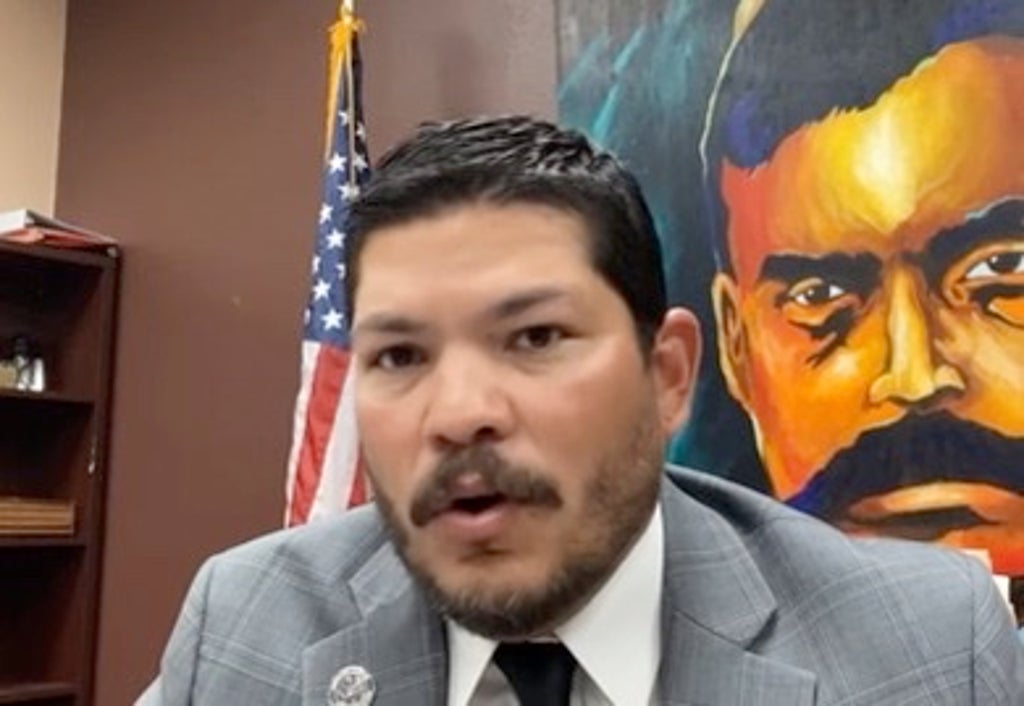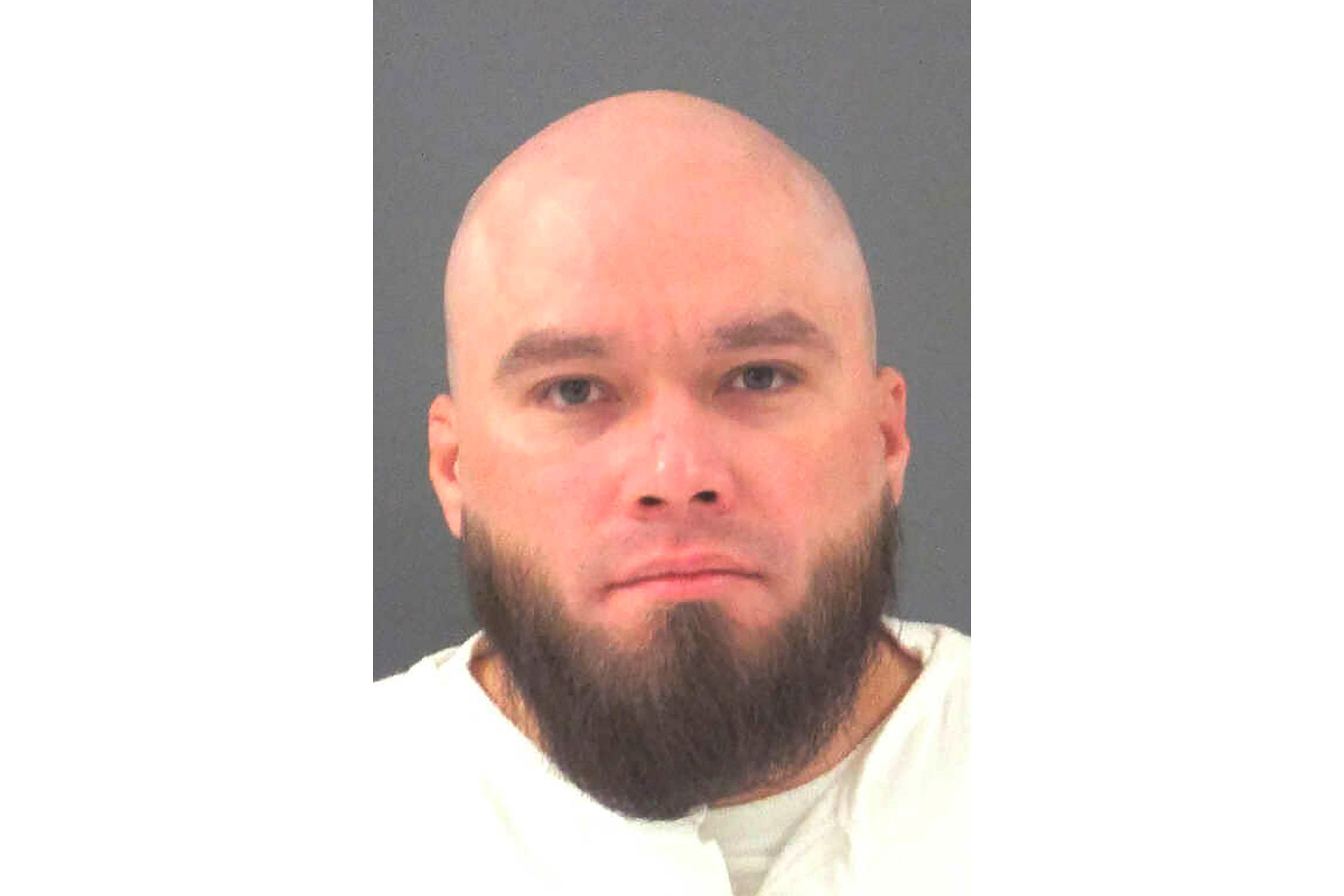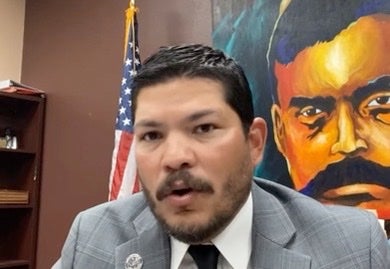
A Texas prosecutor has shared an emotional video explaining his change of heart over the “unethical” death penalty for a man convicted of murdering a store clerk to steal $1.25 – just days after his office requested a date for his execution.
Nueces County District Attorney Mark Gonzalez said in a Facebook Live from his office on Thursday afternoon that he had withdrawn his request for a death warrant and an execution date for John Henry Ramirez saying it was the “right thing to do”.
Mr Gonzalez said he will now refuse to seek the death penalty in any case that his office prosecutes and will also refuse to request execution dates for anyone already on death row.
“I have to deal with my own growth and my own rationales and thinking and logic on why this is even okay but it’s something that I have to do,” he said.
He added: “Also I feel I would be chicken s*** or a hypocrite if I ask for an execution date for Mr Ramirez. I will not seek the death penalty and I’m not going to ask for a date of execution.”
The DA released the video after filing a motion asking a judge to withdraw the execution date for Ramirez, who was sentenced to death for the 2004 murder of Pablo Castro.
The sudden turnaround came just days after Mr Gonzalez’s own office had requested the execution date, leading Judge Bobby Galvan to schedule it for 5 October.
Mr Gonzalez has said that the request was filed by someone at his office without his knowledge.
Yet, this is the fourth death warrant for Ramirez so far issued by Mr Gonzalez’s office.
Now, it is down to Judge Galvan to approve the withdrawal of the death warrant.
After this is done, Ramirez’s life will likely be spared for the remainder of Mr Gonzalez’s term in office, which is due to end in 2024.
The DA’s successor could then reinstate the death warrant and request a new execution date for Ramirez.
It is also not yet clear if the DA’s office will face any legal challenges to his decision to stop the execution.
In the 19-minute-long Facebook Live video, the DA explained his sudden reverse in course saying he has a “firm belief that the death penalty is unethical and should not be imposed on Mr Ramirez or any other person”.
“The decisions we make sometimes here in this office are very hard…” he said.
“I have a set of policies and principles and at the end of the day I have to follow them and I have to be true to who I am.
“And I have for a while now said I do not believe in the death penalty.
“My office is not going to seek the death penalty anymore. That’s just the way I feel.”
He insisted his decision was “not based on emotion” but had been reached after weighing “the pros and cons in every situation”.
He pointed to several reasons for why he said it is “better not to ask for the death penalty”, including that it is “not cost-effective” with only 3 per cent of people sentenced to death actually being executed, that 9 per cent of those sent to death row are innocent, and that the death penalty disproportionately impacts people “of color, low economic status or even low intellect”.

Mr Gonzalez went on to say that he agrees with the premise of “an eye to an eye” when an individual is at risk of deadly violence from another person, but does not think the government should have the power to choose who should die.
“Dude, if you come at me or if you’re about to hurt my daughters, my wife, my family, I will shoot you, I will stab you, I will do whatever I need to do to protect my family,” he said.
“And in the eyes of the law I feel I would be justified.
“But I don’t think that the government should have that power to put people to death.”
He explained that “trials are so complex” with issues around jury pools and poor representation meaning that there are “too many variables in place”.
While he said Ramirez’s guilt is not in question, he said the stance he is making is about his overall beliefs on the death penalty and not over this one individual case.
On the night of 19 July 2004, Ramirez, then 20, and two women, Christina Chavez and Angela Rodriguez, arrived at the Times Market convenience store in Corpus Christi where Mr Castro, 45, worked as a store clerk.
The trio wanted money to buy drugs and got into an altercation with Mr Castro.
During the confrontation, Ramirez stabbed Mr Castro 29 times with a six-inch blade.
The trio then made off with just $1.25 in stolen cash.
After the slaying, Ramirez evaded capture for years, going on the run and fleeing to Mexico where he started a family.

In 2008, he was finally arrested at the Texas-Mexico border and charged with murder and robbery.
He was found guilty and sentenced to death in 2008 and has been on death row ever since.
Ramirez, now 37, issued an appeal to the US Supreme Court asking for his Baptist pastor to be allowed to join him inside the execution chamber, place his hands on him and pray aloud as he is put to death.
The state of Texas had previously denied his request but the US Supreme Court sided with Ramirez last month, saying that prison officials must comply with the request if he is put to death.
Ramirez’s case comes at a time when fellow Texas death row inmate Melissa Lucio is also fighting to halt her own impending execution, which is set for 27 April.
Lucio, a Hispanic mother of 14, was convicted of the murder of her two-year-old daughter.
She has long maintained her innocence, saying that her child sustained her fatal injuries falling down the stairs of their home.
Lucio’s attorneys also say that evidence was withheld at her trial and that her purported “confession” was falsely obtained.
Last week, Cameron County District Attorney Luis Saenz said it was likely that she will get a stay of execution.
Mr Gonzalez pointed to Lucio’s case saying he hopes she also “gets a shot” at stopping her execution from going ahead.
In Ramirez’s case, Mr Gonzalez said that he understands some people will be angry with his decision but he urged people “to read up and educate yourself about how the death penalty actually works”.
The Independent and the nonprofit Responsible Business Initiative for Justice (RBIJ) have launched a joint campaign calling for an end to the death penalty in the US. The RBIJ has attracted more than 150 well-known signatories to their Business Leaders Declaration Against the Death Penalty - with The Independent as the latest on the list. We join high-profile executives like Ariana Huffington, Facebook’s Sheryl Sandberg, and Virgin Group founder Sir Richard Branson as part of this initiative and are making a pledge to highlight the injustices of the death penalty in our coverage.







